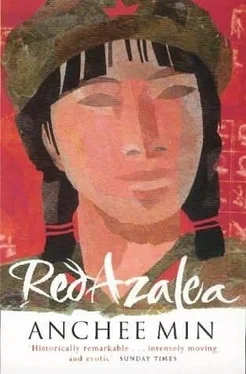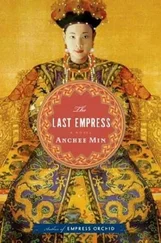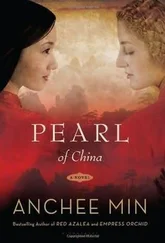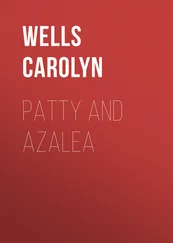I was awakened by the noise of someone exercising her voice outside the window. It was six in the morning. I got up and stepped outside. The dog-tail grass swayed in the rising sunshine. With one hand behind her ear, Firewood pushed her voice until it cracked. We said good morning to each other and I heard her voice crack again. Firewood told me that she was frustrated by her voice. She asked me if I could show her my voice. I said, We are not going to be trained to serve the opera troupes, are we? Firewood slid down into a split. She did not answer me as her facial muscles twisted in pain. Do you know Comrade Jiang Ching? Firewood asked. I looked at her, I looked at that proud face. I knew the question need not be answered. Firewood swung her torso left and right. I know a little thing about her, she said, bending toward me. She likes to watch western movies, especially American Hollywood movies. What are Hollywood movies? I asked. Firewood gave me a secret smile, then went back to her exercises.
I leaned my head backward and stretched my arms toward the wall. It surprised me to see three figures standing behind me. My other roommates-Cheering Spear, Little Bell and Bee OhYang-had been listening to the conversation. I made a friendly smile at them. They spread out and started stretching their limbs.
A guard stopped sweeping leaves by the gate with a broom made of bamboo and walked over to our little house. He was a middle-aged man with a dark beard. His name was One Ounce. He said, Sound of Rain sent me to tell you to get ready. You are going to be inspected by the Supervisor.
We put on outfits that would make a good first impression. Firewood put on another vermilion shirt and sea-blue navy trousers. Cheering Spear dug out a garment printed with square patterns. Bee OhYang took out two slightly different-colored white shirts and tried to make up her mind. I decided to wear my old uniform, the one given to me by Yan.
We sat in the room by our beds, all dressed up, waiting. The temperature in the room rose with the sun. I saw a lump of muddy stuff in the corner under Cheering Spear’s bed. It was the body of the cricket that had followed me into the room last night. It was motionless on the floor.
Cheering Spear was standing by the door, where a little mirror hung. Looking at herself in the mirror, she played with her hairpins. She tried to curl her bangs. Her face displayed her ambition. She took a cotton ball and rubbed a pimple underneath her nose. She rubbed back and forth, moving her features up and down.
Observing Cheering Spear, I suddenly felt short. Her beauty discouraged me. I tried to ignore my fear.
I took a pen and made some scratches on the paper. Dear Yan, I wrote, and then scratched it. Dear Yan, I wrote, and scratched it again. Selected works of Mao Tse-tung, I wrote. Criticism of revisionists. Yan, how are you? I tore up the paper. The Supervisor did not come.
I had a nightmare that night. Yan had become a faceless figure who wandered the fields of the farm. A sleepless night followed. It rained at dawn. The dropping sound of the rain took me back to Red Fire Farm into Yan’s mosquito net.
After lunch a whistle blew. At the gate we saw Soviet Wong. Behind her were about twenty young men. They marched past the gate. These are the chosen boys, Soviet Wong introduced them. You will be working together in the future. The men had one similar face-big double-lidded eyes, thick eyebrows, Buddha-like nose and mouth. They looked as similar as if made from the same mold. No one said hello. We stood. One man suddenly flushed. Soviet Wong asked him to tell the reason why his face flushed. The young man tried to tackle the question. He scratched the back of his neck. He said it was because he was not used to looking at women. Soviet Wong said, Is your mother a woman? Don’t you dare say that you have never looked her in the eyes before. The man went speechless. Soviet Wong continued, If one has no guilty thoughts, one’s face should not flush. The man who had flushed lowered his head. The redness went down to his neck. The others who were standing next to him gave him pitiful looks. You may weigh my words later, said Soviet Wong.
These young men had been brought to Shanghai to play supporting roles in Red Azalea, and in all the time I was at the studio we never spoke, except to read lines to each other.
Soviet Wong took us to an old building covered with ivy. Behind the huge rusted iron door a heavy smell of mold rushed out. I covered my nose with my hand. Soviet Wong immediately showed irritation. I cannot believe someone who used to be a peasant is afraid of bad smells. Is the smell worse than pig shit in rice paddies? I put down my hand quietly.
One Ounce turned up a dim light. We were in an unused studio with a stage set like a cave and a few rows of benches. Soviet Wong sat us down. We began to read Mao’s talks on the arts again.
I had a hard time concentrating on Mao. My mind kept flying away. For three weeks we had had classes on politics, Mandarin, acting technique and Wu Shu-various kinds of Chinese traditional boxing and fencing. Comrade Jiang Ching was trying to develop something new in China, trying to combine film and opera, although no one knew how to make films work. The result was films with a strong flavor of opera-the makeup, the lighting, the stylized voice and pose. And now it was the proletariat, and in particular women, who were the heroes. People all over China had to see the films, or be labeled reactionaries.
With all the lessons, life seemed full every day. But secretly we had been waiting, waiting to be inspected by the Supervisor. The waiting seemed endless. Sound of Rain showed up once in a while, always delivering a report on the new achievements in the arts: Mao and his Politburo members had just watched and praised Comrade Jiang Ching’s new model opera. Sound of Rain would drop a stack of newspapers and a copy of the opera’s manuscript, asking us to read them and write study reports. We read and wrote. We discussed Mao’s idea of the proletarian arts.
One day we were told that we now had become special material. We were ready to compete for Comrade Jiang Ching’s big assignment.
It was the title role of Red Azalea. Red Azalea was Comrade Jiang Ching’s ideal, her creation, her movie, her dream and her life. If any of us grabbed it, we grabbed the dream of stardom. The story of Red Azalea was a story of passion in the midst of gunfire. It was about how a woman should live, about a proletarian love unto death. To me, it was not only about the past wartime, about history, but it was also about the essence of a true heroine, the essence of Yan, the essence of how I must continue to live my life.
Soviet Wong read through the screenplay. Her tears spattered down on the script. At first I thought that she was moved by the story, then I sensed it was something else. Her sadness did not come from the story but from despair, the despair that she could never be allowed to play the role she desired. She had to teach us to play the role she wanted to play. Her youth and beauty would be wasted on teaching us. She was assigned to teach people she wished to stab. She was tormented and murdered by our growth.
We took turns reading the parts. I saw the other three, Firewood, Little Bell, Bee OhYang, falling out of the race. They were not in touch with the role. They were not feeling the pulse of Red Azalea. Cheering Spear was different. Cheering Spear was approaching the role. She was getting closer, even closer than I. Too close. She put me in danger. She was taking away my hope.
Cheering Spear had been in touch with everything. There was never a moment she had nothing to say; everyone else had their mouths shut and sat nervously. She always had something to say. Things that were useful to advance her future. She said that she admired Soviet Wong, that just being near her made her happy. She did not say this in Soviet Wong’s presence; she said this at meetings, meetings at which the secretary on duty would take notes, which Soviet Wong would get to read later on. Cheering Spear said that she was not even close to being as good-looking and talented as Soviet Wong. Then she would contradict herself and say that she resembled Soviet Wong a great deal, while in fact their looks were as different as an elephant and a pig. Cheering Spear was never ashamed of her flattery.
Читать дальше












